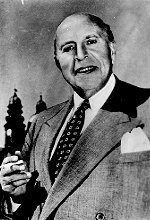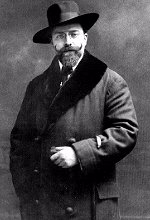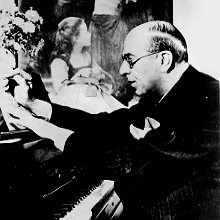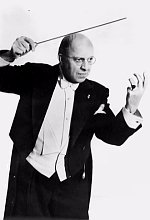| [naar
inhoudsoverzicht muziekgeschiedenis]
[naar
inhoudsoverzicht korte biografieen]
[terug naar inhoud
biografie Stolz]
[naar
literatuurlijst]
inhoud:
|
BIOGRAPHY first part (1880-1932)

introduction
When Robert Stolz died at the age of 95, he had already become a legend.
He called himself the „last Viennese waltz and operetta conductor of the
first moment". Worldwide known are his operettas „Zwei Herzen im Dreivierteltakt"
and
„Wenn
die kleinen Veilchen blühen", a paragon of the Viennese spirit
are his evergreens „Servus, Du" and „Im Prater blühn wieder
die Bäume".
Robert Stolz was exclusively composer and conductor of light music
and in the second half of the 20th century, through which he went with
all its ups and downs, he was considered to be the last great exponent
of the „silver age of operetta", marked besides him by the names of Franz
Lehár, Emmerich Kálman, Leo Fall and Oscar
Straus. Though „only" composer of the „lightly draped Muse", he was
showered with honors more than many other musicians at an old age. The
city of Vienna made him an honorary citizen, the Austrian government appointed
him as professor, as film music composer he was twice nominee for the „Oscar",
monuments were raised for him, streets and places were neamed after him.
Austria has two Robert Stolz museums, on the occasion of his 100th birthday
in 1980 special stamps were issued and commemorative medals were
minted and a „Robert-Stolz-Express" plies between his native town Graz
and Vienna.
Youth in Graz (1880-1899)
Music accompanied Robert Stolz' life from the start. He was born on August
25th 1880 in Graz as twelfth child of his parents. Jakob Stolz (1832-1919)
was director of the public music school in Graz, where his mother, the
pianist Ida Stolz (née Bondy), gave also lessons.
Robert showed early dispositions to a musical infant prodigy and
the pedagogically experienced parents realized soon that their youngest
would become a musician. The eight-year-old Robert went on tour already
as „pianist" with his father in Graz and its environs and provoked peals
of applause.
The scholastic achievements of the child prodigy were much less
encouraging than his musical performances. Particularly the mathematics
meant a insuperable obstacle for him, he failed in the final examination.
But he pursued his career as musician all the more purposeful: In 1896,
at the age of 16, he graduated from the conservatory of Vienna (among his
teachers were Robert Fuchs and Engelbert Humperdinck) and in 1898
he took up his first position. He became assistant repetiteur at the municipal
theater of Graz. Though this activity was mot paid, it laid the foundations
for his stage experiences.
Career as conductor in Marburg,Salzburg and Brno (1899-1907)
In 1899, Stolz took up his first position as conductor in the Styrian
city of Marburg (today Maribor, Slovenia). His orchestra was composed of
six gypsies, which could not read music, but were excellent musicians:
After having heard the „Zigeunerbaron" twice, they were able to play it.
Stolz appeared here for the firt time as operetta composer and put his
„Studentenulke" on the stage.
Stolz stayed only one season in Marburg. In October 1902
he became second conductor at the theater of Salzburg. He had the spent
the time in between, one and a half years, as soldier, and he owed his
early discharge to the well-meant mediation of his uncle, a medical officer.
As conductor in Salzburg, Stolz succeeded soon in winning the
favor of the critics and he was successful also as composer with the operetta
„Schön Lorchen".
The great Russian tour with an operetta company, to which Stolz
came round in summer 1902, was brilliant and successful at first.
But breaches of contract of the ensemble, forced recasts led soon to a
financial disaster. Stolz reached Berlin without means and earned his living
for some weeks as bar pianist at a brothel. The pianist Alfred Grünfeld
found him there and gave him a financial support. After an interlude as
conductor of a circus company, Stolz found finally in 1903 an engagement,
which turned out to be more stable: He became first operetta conductor
at the German theater in Brünn. Brünn (Brno) had an excellent
reputation as theater city in the monarchy and was known as stepping stone
for young talents. One of the stars, which career started in Brno, was
the tenor Leo Slezak. Here, Stolz was in the position to acquire the practice
and the competence on the conductor's desk, which laid the foundations
of his later international reputation as orchestral conductor. In Brno,
Stolz composed the operetta „Manöverliebe" (première on April
15th 1905) and married the singer Grete Holm, who accompanied him at the
Theater an der Wien.
At the Theater an der Wien (1907-1910)
The engagement at the Theater an der Wien, the leading operetta stage in
Vienna, was for Robert Stolz the present height of his career. He conducted
here a work, which was through with already more than 400 performances:
„The Merry Widow" by Franz Lehár.
He staged his own works at smaller Viennese theaters. The variety
theater „Colosseum" at Nußdorferstraße was the scene
of the première of „Die Lustigen Weiber von Wien" (1908),
which libretto was written by the two experienced authors Julius Brammer
and Alfred Grünwald. The „Lustige Weiber" were performed here
in the course of a variety program, between acrobatic numbers, an usual
form of presentation at that time. Eight pieces were published as music
and gave welcome supplementary earnings to the composer.
One year later, Stolz' one-act operetta „Die Commadeuse" (text
by Egon dorn) was performed again at the „Colosseum". But in the meantime,
the composer planned to write a three-act, full-length work. He composed
„Das Glücksmädel", text by Friedrich Thelen and Robert Bodanzky,
which was performed for the first time on October 28th 1910 at the
Raimundtheater, Robert Stolz conducting. Star of the evening was the extremely
popular folk-play actor Alexander Girardi.
At that time, the private life of the composer was contrary to
the public successes. His infidelity with the cabaret singer Franzi Ressel
(she became his second wife) was exposed and the marriage with Grete Holm
went on the rocks.
As freelance composer in Vienna - the song „Servus Du" (1919-1918)

The compositional successes of the early years in Vienna encouraged
Stolz to take the risk to leave the sure post at the Theater an der Wien
from autumn 1910 on and to live on his earnings as composer and
on short-term engagements. One year after the „Glücksmädel" another
grat Robert Stolz operetta was performed for the first time at the Raimundtheater:
„Die
eiserne Jungfrau". Stolz had started the work already soon after leaving
the Theater an der Wien in July 1910. This time, his librettist
was Viktor Léon, to which greatest successes belonged the libretto
of the „Merry Widow". But „Die eiserne Jungfrau" did not succeed.
Only four years later, when it was put on the stage in Stuttgart-Bad Cannstatt
in a revised version as „Das Lumperl", it scored a great success.
The most popular os Stolz' works at that time was not an operetta,
but a song in three stanzas: "Servus Du" (1912). The composer told
often and with pleasure its history of origin. One evening, that he passed
with his friend, the author Benno Vigny, in the rather disreputable „establishment"
of Madame Kathrin at Bäckerstraße, he asked Vigny to prove his
skill as poet and to write a poem on the spot. A few minutes later, Vigny
handed the three stanzas of the chanson „Servus Du", which he had
written on a little bag for lack of paper, over to his friend. Also on
a paper bag and in a short time Stolz reciprocated with the setting to
music, which showed completely for the first time his individual compositional
originality.
New media
In this period, the major part of the composer's activities concerned the
cabaret. The loving and companionable relations between him and Franzi
Ressel was cemented. He accompanied her on the piano when she took
the floor as cabaret singer. Open to all new, Stolz took an interest in
the young medium of the record. Recordings of chansons (sung by Franzi
Ressel, accompanied by Stolz) from before World War I are still preserved.
The cinema and the movies gave a composer of light music also
new opportunities. In 1913, Stolz was commissioned to compose the
music for the silent film „Der Millionenonkel". Contrary to the
usual movie music of that time, which was exclusively played by one pianist,
it had to be an incidental music for great orchestra this time. The film
was conceived as particular tribute to Alexander Girardi and showed the
star in thirty of his most successful stage parts. Therefore, Stolz used
music of the corresponding works and tied them in an individual way.
World War I
When the First World war broke out in 1914, the composer was drafted
again into the army. But he was - to his delight - transferred to the band
and acted as assistant conductor of the „Deutschmeister", which
band was considered to be one of the best and most famous of the whole
Austrian army. He called his encounter of military music fascinating: „It
was typical of the old monarchy to go to the front in the dark days of
its fall with antiquated, badly equipped armies, which were accompanied
by the best bands of the world..."
The principle, that during the war the Muses had to be silent, does
not apply to World War I. Just in the field of the operetta a multitude
of works were composed which dominated the repertoire still decades later.
The musical life flourished. During the war years, Stoz led a „double life":
In the daytime he played marches and dance music with the Deutschmeister,
in the evening he started his second life and composed his topical Viennese
songs and music-hall songs. He composed three of his most beautiful songs
in the middle of the war: „Wien wird erst schön bei Nacht"
(text by Wilhelm Sterk), „Im Prater blühn wieder die Bäume"
(Kurt Robitschek) and in spring 1918, in the dismal mood of the
perishing monarchy, „Das ist der Frühling in Wien" (Arthur
Rebner).
Stolz seized every opportunity to compose a new operetta. His
music for the spectacular play „Prinzessin Revue" (Budapest 1916) is forgotten,
but his operetta „Der Favorit", performed for the first time in April
1916 at the Komische Oper Berlin himself conducting, included a song,
which ranks till today with the most known Stolz evergreens: „Du, du,
du sollst der Kaiser meiner Seele sein".
Post-war time in Vienna (1918-1924)

Robert Stolz 1923
The years after 1918 were for Austria, which had become after
the lost war a small state out of a European Great Power, a period of general
hardship, privations and hopelessness. A great influenza epidemic supervened
in 1919, which claimed heavy casualties and to which the father
of Robert Stolz succumbed too. Stolz felt the death of his father a heavy
blow. More than everything else it meant for him the end of a whole epoch.
The composer devoted himself now mainly to the cabaret and particularly
to the enrichment of the repertoire of his wife Franzi. In 1919,
he founded with Otto Hein the „Boheme-Verlag" (Boheme publishers) and the
same year they published a song, which „hit in the bull's-eye": „Hallo,
du süße Klingelfee". The operator, which had to put through
the calls, was called „Klingelfee". The song was soon sung in Russian and
Czech, in English, French and Italian. In Paris, Jean Gabin integrated
it within his repertoire. Nearly just as successful was „Salome, schönste
Blume des Morgenlands", an „oriental fox-trot". Arthur Rebner wrote the
texts of both songs.
The changes after World War I changed the vital consciousness
and the musical sense too, the Jazz and the American rhythms celebrated
a triumphant advance in Europe. Robert Stolz did not close his eyes to
this trend. In April 1919, he composed his first Valse Boston, the
„Klingelfee" was a one-step, the „Salome" a fox-trot. But this was not
a leave-taking of the operetta: In 1920, „Das Sperrsechserl" was performed
for the first time at the Wiener Komödienhaus (it had about 2,000
performances in all at Viennese theatres) and „Der Tanz ins Glück"
at the Raimundtheater. In 1921, „Die Tanzgräfin" and „Eine Sommernacht"
were performed for the first time at the Johann-Strauß-Theater and
in 1922 „Die Liebe geht um" at the Raimundtheater. The first opera
attempt came also at this time: the one-act opera „Die Rosen der Madonna".
Failure as manager of a theater (1924)
The wish to run an own theater ended for Stolz in 1924 in a financial
catastrophe. He took over the variety theater „Max und Moritz" at the Annagasse
in Vienna, which had still no fully valid theater license. A regular seating,
a new lighting system, fire protection facilities and additional investments
swallowed up enormous means. Though the opening work „Ein Rivieratraum"
(by Bruno Hardt-Warden and Karl Farkas) turned out to be
a success, the theater as such became a lossmaker, which Stolz called in
retrospect „the greatest fiasco of my whole career". Domestic problems
supervened: The composer had separated from his wife Franzi already in
1923
and already one year later the marriage with his third wife Josephine Zernitz
went on the rocks.
Before the „Rivieratraum" Stolz has been a well-off and distinguished
man, now he had lost both his whole fortune and his third wife. To escape
his creditors, he bought with his last money a ticket to Berlin to build
himself a new existence.
Berlin - the second career (1925-1932)
In November 1925, Robert Stolz arrived in Berlin. He was not unknown
here. He had long-standing relations with the „Drei-Masken-Verlag" (publishing
house). The first place he visited in Berlin was the „Kabarett der Komiker",
founded by Kurt Robitschek, the librettist of „Im Prater blühn wieder
die Bäume". Robitschek commissioned a hoped-for composition from him
and already on December 1st 1925 „Märchen im Schnee" was performed
for the first time. The stars Max Pallenberg, Paul Morgan and Max Hansen
as well as the rousing music helped the small work to become a success.
The Drei-Masken-Verlag offered the composer a permanent contract. The generous
advance put Stolz in a position to meet his old debts - Vienna was now
open to him again. Nevertheless, he opted for remaining in Berlin, because
at this time the German capital had already outstripped Vienna as operetta
city.
In his early years in Berlin, Stolz composed „Der Mitternachtswalzer",
which was performed for the first time in Vienna in 1926. In 1927,
„Eine einzige Nacht" was also put on the stage in Vienna and his success
held.

Composed at the piano
„Zwei Herzen im Dreivierteltakt" (1929)
Around 1928, the cinema reached a new dimension: The sound film
replaced the silent film. For the composers of the musical entertainment
genre, this meant a colossal challenge and Stolz showed again his instinctive
reliability in taking up new instruments of expression.
In 1929, the „Super-Film-AG" asked him, if he was willing
to compose the music for musical film „Zwei Herzen im Dreivierteltakt".
The title waltz is one of the worldwide known Stolz melodies. He had also
a reigning function within the film action. A composer has the inspiration
to a waltz melody during a night with a „sweet girl". But in the morning,
he has forgotten it and he can not find it as well as the young lady whom
he has to thank for the inspiration. They meet again, she inspires him
anew to the melody and they become man and wife. The idea of the film inspired
Robert Stolz immediately and during the lunch after the conferring of contract
he found the waltz that he noted down on the menu card of the hotel for
lack of music-paper. The movie was presented for the first time on March
13th 1930 in Berlin and achieved great success. A critic wrote less
aptly in the „Berliner Zeitung": „Stolz composed an excellent music...
Unfortunately the title waltz is a failure". Forty years later, a polling
institute in the USA ascertained the most popular waltzes of the world.
It turned out that „Zwei Herzen im Dreivierteltakt" held the second
place behind Johann Strauss' "An der schönen blauen Donau".
Evergreens in movies and operettas

Stolz as conductor
From 1930 to 1932, within three years, Robert Stolz composed
and conducted the music of seventeen films in all. A lot of his evergreens
were heard at first in movies and became known with them: „Heute nacht
- eventuell" (film title and main song), „Ich will deine Kameradin sein"
(from „Hokuspokus"), „Musikant, Musikant, wo ist deine Heimat" (from
„Ein Tango für dich"), „Adieu, mein kleiner Gardeoffizier"
(from „Die lusitigen Weiber von Wien"). As movie star, Jan Kiepura carried
the public away with „Mein Herz ruft immer nur nach dir, o Marita"
from the film „Mein Herz ruft nach dir".
Ralph Benatzky composed the music for the operetta „Im Weißen
Röss'l", which was put on the stage in November 1930 at the
Große Schauspielhaus in Berlin. But it included interludes by other
composers, which became real „hits" and caused the great success of the
work: „Was kann der Sigismund dafür, daß er so schön ist"
is written and composed by Robert Gilbert, „Die ganze Welt ist himmelblau"
and „Mein Liebeslied muß ein Walzer sein" by Robert Stolz.
His consent that his two interludes were settled by flat-rate royalties
cost him a fortune. Zurich was the scene of two successful operetta premiéres
in 1932: „Wenn die kleinen Veilchen blühen" and "Venus
in Seide".
|